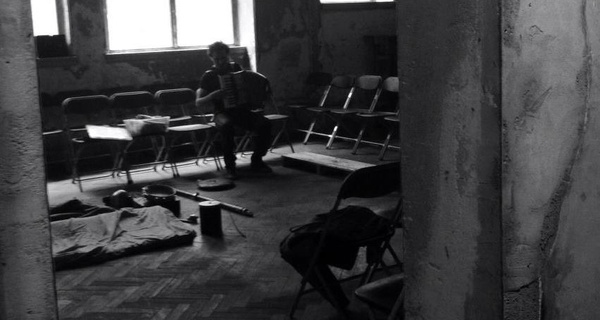
Maddy Costa on It's Like He's Knocking
Excert from Maddy Costa's blog Deliq. Read the full artcile here.
...This latest bout of whatever it is – depression? Suffocating sadness? Desire to just fucking stop and live in a limbo of quiet, feeling nothing? – began to seep through me a few days before seeing Leo Kay's It's Like He's Knocking, on Friday 11 July. Sometimes the show feels like a dangerous place to be. It starts in a darkened bar, Kay raising a toast to “telling it like it is, even if you don't know how it was”. We each drink a shot but he drinks at least four, and there is something so careless in this action that the basement room in Shoreditch Town Hall begins to hum with worry for him. We move to another room, fitted up like a meagre bedsit, and anxiety grows. Alcohol ran through the blood of his forefathers, and depression, and loneliness, and uncertainty. My father and his father and his father, Kay cries, not in words so much as the pulse of the heart. This is a story of wild coincidences and wilder adventure, and the overwhelming fear that, however damaged your ancestors, you will never, never live up to them. It's a story of choosing to live and choosing to die: and if you chose the latter, how would you do it? With a noose in the toilet or jumping off a tall building? Or the way Kay's grandfather chose, alone in a bedsit in the centre of London, with the door and windows sealed and the gas of the oven filling the room?
It's a dangerous place to be, but Kay offers a measure of care. He fills our eyes with beautiful images: the light that beams through a makeshift porthole on the ship that carried his grandfather to America; the descriptions of the women his grandfather loved; the glow of a beach in Israel. He fills our ears with gorgeous sounds: a charged exchange between tambourine and accordion; the growl of Leadbelly, the wash of the sea. Kay's own voice, the amber of whiskey, the keen of viola. On one wall he's pinned a note that reads, very roughly: depression grows in the gap between the story you tell about yourself and the truth. Like there's a truth. Kay's honesty feels like a gift: by now, in his early 40s, he'd thought he would be a father himself. And he didn't expect his father to have died. The show becomes a eulogy, for complicated relationships with difficult men, whose absence creates a void in the soul. A void Kay fills with this performance, dedicated to his father and his father, fragile and tender and spare.
But every time Kay reaches for a bottle, a shiver runs through the audience. There is relief in the fact of this work being a collaboration, with the audience who willingly engage in a wager (in a sense, to save him), and with a Brazilian musician whose thrumming soundtrack heightens the impression of extended ritual – a ritual that culminates in the summoning of a spirit, as Kay, now dressed in a suit, hair slicked back, throat burning with booze, re-creates with swaggering gestures an 8mm film in which his grandfather imitates Charlie Chaplin. Strobe lights flicker like the shake of the movie, and Kay – or his grandfather – stamps and sways and barely stays upright. And even if this is meant to be a happy film, I don't read joy in these flailing movements. Kay's grandfather is twisted or bent over with the weight of anger and resentment and unbearable sorrow. He is drunk with the indignity of being human and alive.







